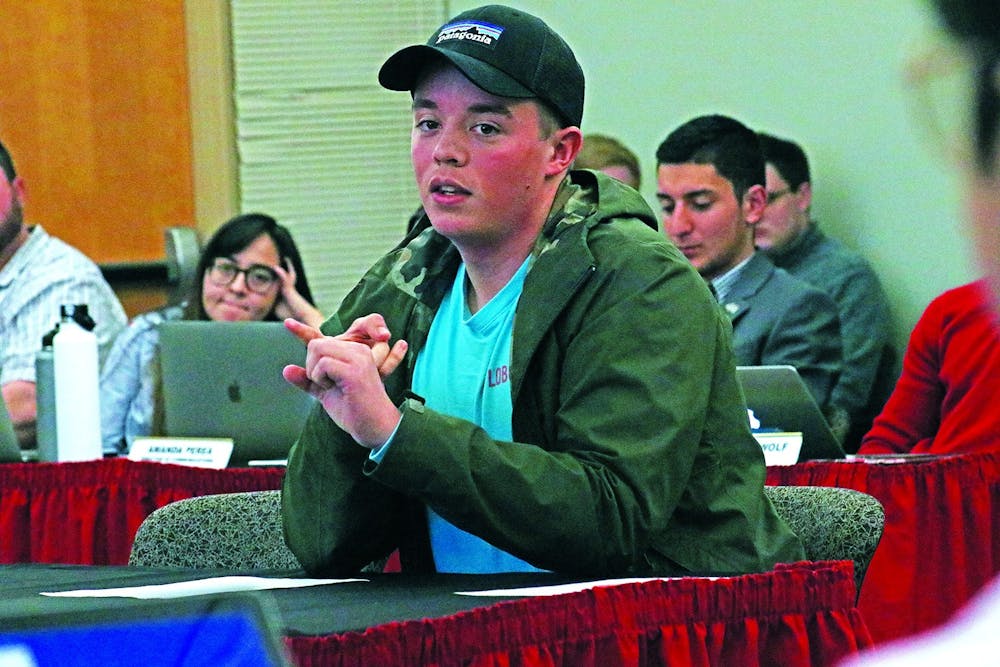Editor’s note: The approval of this legislation by the student body would financially benefit the Daily Lobo. The editorial board neither supports nor opposes a student government fee raise.
A $5 fee raise is headed to the undergraduate student body for a vote during the March student government presidential and vice-presidential elections.
19 of the 20 undergraduate representatives voted for Bill 4S after nearly 30 minutes of public comment and debate over the strengths and weaknesses of each fee raise bill. This approval comes in the wake of what has been called a budget crisis within the Associated Students of the University of New Mexico body.
John Cooke, Interfraternity Council (IFC) president and Sigma Chi fraternity vice president, returned to the full Senate to express his view on the importance of raising the student government fee during public comment.
Cooke asserted the fee raise is critical because — aside from inflation and a nearly two-decade hiatus since the last student government fee raise — the University, on the whole, does not invest enough in student life on campus.
"They are killing us off one by one," Cooke said. "They wonder why student enrollment has dropped 22% in five years — well it’s because, in all honesty, this is a very boring campus."
Cooke added that the financial problems the student government is facing are not solely ASUNM's fault.
"For the longest time, I said that ASUNM is worthless — I apologize, I was wrong," Cooke said. "You guys are handcuffed by this administration, you guys are handcuffed by people well above you, and you can’t do anything about it."
Cooke went on to reiterate that he believes the fee raise should actually be higher, but that either fee raise bill was a necessary start to amend the budget issues ASUNM faces.
The victorious bill was not the only fee raise option the Senate considered.
Bill 5S would have prorated the fee raise at $2.08 per credit hour, rather than the current $1.67 per credit hour rate, and was projected to gather about $777,208.75 — about $1,000 more than the prevailing bill — according to a presentation by Chief of Staff Jacob Silva and Deputy Chief of Staff Victoria Peña-Parr during public comment.
ASUNM is currently able to function due to a one-time $500,000 funding dispensed by the Student Fee Review Board, according to Silva.
Get content from The Daily Lobo delivered to your inbox
Former ASUNM Senator and current Projects Director for Governmental Affairs Gregory Romero also spoke on the importance of the fee raise during public comment.
"Without this increase, we are projected at $638,000 roughly, and last spring as a Finance senator, we allocated $634,000 just in spring budgets alone," Romero said. "So with an increase in salaries, along with that number being the typical number we do in the spring, you can see that we will have almost no money for appropriations or any other form of funding (without the raise)."
Still, not all ASUNM-adjacent people were easily sold on the fee raise.
Former ASUNM President Pro Tempore Xavier Torres, who does not currently hold a position in ASUNM, warned senators to consider the deeper implications of the fee raise.
"I think if you ask most students on this campus, they would say to take away the ASUNM fee altogether because it doesn’t impact them at all," Torres said.
Torres raised concerns over the true representation within ASUNM voter turnout for elections.
"Last semester, we had a thousand students vote in the election — 1,000 students out of 16,000 total. I think that’s pretty unfair to the rest of the student body," Torres said.
He also pointed out that although all students can attend and make use of ASUNM’s resources, the numbers do not reflect that.
"I know Red Rally and Fiestas are the highest attended events — it's about 1,000 and I think 3000 — still, no one goes to the biggest events we have at this campus," Torres said. "It’s easy to say 'let’s raise the fees and everything will get better,' but I feel like that's not how things work."
Even so, many senators contended that Bill 4S was the best and most transparent option ASUNM had because it would specifically label the $25 fee as a government fee on the Bursar site, rather than a more ambiguous prorated amount.
"This is the more transparent option," Senator Ryan Regalado said of Bill 4S.
Although most senators echoed this sentiment, Senator Ilan Jaffe disagreed with the ethics of charging every student a $25 fee because some students are only taking one credit hour.
"Transparency cowers in the face of morality," Jaffe said.
The constitutional amendment will now head to the ASUNM ballot beginning March 9.
Alyssa Martinez is a beat reporter at the Daily Lobo. She can be contacted at news@dailylobo.com or on Twitter @amart4447






